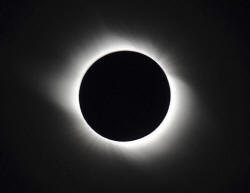|
 Chinese cheered by eclipse a week before Olympics Chinese cheered by eclipse a week before Olympics
 Send a link to a friend
Send a link to a friend
[August 02, 2008]
XI'AN, China (AP) --
Finally, China had an act of nature it could celebrate. After an Olympic year of freakish natural disasters, crowds of Chinese watched a total solar eclipse along the country's ancient Silk Road on Friday, one week before the start of the Summer Games in Beijing.
It was a welcome respite after a 2008 that began with heavy snowstorms at the Chinese New Year, followed by China's deadliest earthquake in a generation, then river flooding
- and even a huge algae bloom at the Olympic sailing site. Online, some Chinese murmured about curses.
|
|
 But on Friday evening, the eclipse - once a bad omen for China's imperial rulers
- was cheered by a country eager for any auspicious sign before the games. State media called China's first solar eclipse of the century the "Olympics eclipse," and TV stations broadcast it live. But on Friday evening, the eclipse - once a bad omen for China's imperial rulers
- was cheered by a country eager for any auspicious sign before the games. State media called China's first solar eclipse of the century the "Olympics eclipse," and TV stations broadcast it live.
"Listen, I think everyone hopes this will bring some luck," said Xiao Ning, one of hundreds watching on the old city wall in Xi'an as the eclipse darkened the sky near sunset in this ancient capital and Silk Road terminus.
Told by the local newspaper's front-page story to watch the eclipse safely through darkened film, people held up X-rays of teeth and other bones, cheerfully tearing the sheets into smaller pieces to share with others.

The eclipse began in the Canadian Arctic, then passed over Greenland, western Siberia and Mongolia before reaching China.
It took a poetic course across China, where the first recorded solar eclipse was found scratched into Shang Dynasty oracle bones more than 3,000 years ago.
Following the northern route of the ancient Silk Road, it passed over the western desert county of Yiwu, where about 10,000 tourists gathered to watch after astronomers said it would have the best view; over Dunhuang, where the oldest known map of the stars was found in a desert cave a century ago; and over Jiuquan, where China launched its first manned spaceflight.
The eclipse trailed off just beyond Xi'an in the central China region once considered by Chinese to be the center of the world. The Olympics, and its endless official promotion, will bring back that feeling.

Despite the ruling Communist Party's emphasis on scientific thinking, China still has its superstitions. The date and time of the Olympics' opening ceremony on Aug. 8 are stuffed with as many number eights as possible because "eight" in Chinese sounds like "fortune"
- it starts at 8 p.m. on the eighth day of the eighth month of '08.
But adopting the solar eclipse as a good sign meant stripping away the old superstition about it being the unluckiest event in the sky.
In ancient times, it was believed a dragon was eating the sun. Emperors were blamed and had to apologize for angering the heavens.
[to top of second column] |
 Later, being able to predict solar eclipses and show control over the skies became so political that some eclipse reports apparently were manipulated, said John B. Henderson, a history professor at Louisiana State University who has written about Chinese cosmology.
"Eclipses were reported where none took place, in areas of political or bureaucratic strife," Henderson said. "It may have been a means of voicing dissent."
On the city wall, Xiao Ning said the eclipse did have some relation to a 6.1-magnitude aftershock earlier in the day in neighboring Sichuan province, the site of May's devastating earthquake, but he seemed to be alone in his opinion.
The urge to seek links between the Olympics and natural phenomena such as the eclipse is understandable, if not exactly rational, said Jiang Xiaoyuan, a social sciences professor at Shanghai's Jiaotong University who has written about astronomy research and patriotism in China.

"We'd already known about this eclipse many years before we got the right to host the Olympics, so how can we explain this is retribution?" Jiang said.
After the eclipse ended, people coming down from the wall paused at the sight of a more than 6-foot-long telescope mounted on a bicycle cart. Niu Guodong, a 54-year-old retiree, stood in undershirt and rolled-up pants urging bystanders to take a peek
- "Jupiter," he said in English. The cost was 10 yuan, or about $1.50.
His name card said "Xi'an astronomy hobbyist." He said he watched the eclipse outside the city, where the buildings aren't so tall.
Asked about the eclipse and the Olympics, he said with disdain: "Please. There's no relation at all."
[Associated
Press; By CARA ANNA]
Copyright 2008 The Associated
Press. All rights reserved. This material may not be published,
broadcast, rewritten or redistributed.
 |